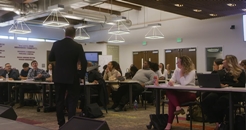 CrossPurpose
CrossPurpose
From a presentation at Praxis Labs The Gathering 2020
Juan Pena came to the USA when he was 14 years old, an immigrant from Columbia, South America. In 2008, he began to become deeply disillusioned with his engineering career and his church experience. His vision became clear - to give the best 30 years of his life to a community and to do a deep walk with the poor.
He and his wife joined a small group of people moving to a Northeast Denver neighbourhood that was severely under-resourced, to start a multi-ethnic church. An African-American mentor of his said, "Juan, you can't solve a problem you don't understand, and you cannot understand from a distance." So as they moved into the neighbourhood and began to build relationships with their neighbours, the problem of poverty struck them right in the face.
And they began to notice that many who are working really hard to solve this complex problem, are asking the question, "How do we help our neighbours in poverty?". But they began asking the question, "How do we help our neighbours escape poverty?".
In 2012, their small little church of 200 started CrossPurpose with a mission to abolish economic, relational, and spiritual poverty through career and community development. Their programme is six months long, and every year they journey with 200 neighbours. When a neighbour is accepted into their programme, they call them leaders because they believe they need to lead their own journey out of poverty.
Their programme has three components.
The first one is career development, not just job placement. They begin with a six week soft skills, personal development boot-camp. After that, they pay for each one of their participants, their leaders, for their career training, so they have a liveable wage skill that makes at least $15 an hour or more.
Their second component is community development. They fundamentally believe that the key for their neighbours to stay out of poverty forever, is relationships. And so throughout their programme, the leaders are building relationships with each other, but they also go out into the community and recruit volunteers that become allies, and they come in and commit to building a relationship with their leaders over six months. All of this comes together on Wednesday nights when they have a weekly family gathering, where they build community through meals and food.
The third component of the programme is spiritual development. And so they have really created a safe, loving, caring environment for their leaders. All of the components are opt-in because they want to preserve agency in the leaders. But two-thirds of their participants take a class, either on exploring God or experiencing God.
Since 2014, they have seen tremendous success and have been able to graduate 473 leaders. Their local growth plan earlier in 2020 was to expand across the city to four different locations over five years. COVID threw a monkey wrench into all of that, but there has been an upside.
Before COVID, the only way that their neighbours could experience their programme was by coming to the campus. And the average commute for participants was 45 minutes each way. Due to COVID, they were forced to move everything online. And over the last five months, they have been able to start two new classes of 50, completely online, and they are seeing tremendous results from this. So as they expand across the city, they're going to build a network of flexible sites, that can simultaneously run a hundred percent face-to-face classes, and also hybrid classes with a mixture of campus and online components.
As they finished their first eight years of ministry, those 473 graduates, accounting for their earned wages, are generating $20.5 million of wealth every year. Over the next five years, they have an ambitious goal to multiply that times four, with a goal to have 1600 graduates, generating $93.5 million every year of wealth for themselves and for the city.
Many alumni are now coming back to the programme to become allies, to help their neighbours exit poverty like they did. It is so much more than just a poverty alleviation programme. They are seeking Shalom through reweaving the fabric of a free society.
See the presentation here.
Watch this 3 min video:
Retweet about this article:
From a presentation at Praxis Labs The Gathering 2, 08/12/2020